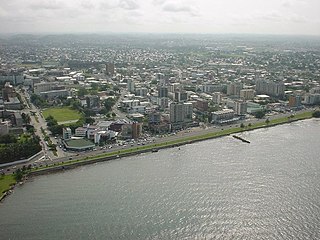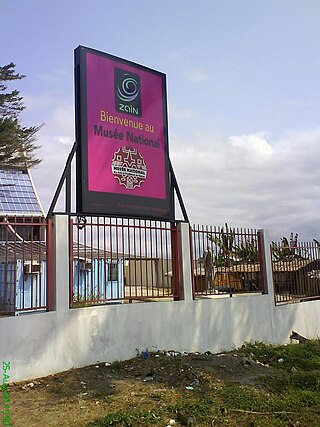
Gabon, officially the Gabonese Republic, is a country on the Atlantic coast of Central Africa, on the equator, bordered by Equatorial Guinea to the northwest, Cameroon to the north, the Republic of the Congo on the east and south, and the Gulf of Guinea to the west. It has an area of 270,000 square kilometres (100,000 sq mi) and a population of 2.3 million people. There are coastal plains, mountains, and a savanna in the east. Libreville is the country's capital and largest city.

Libreville is the capital and largest city of Gabon, located on the Gabon Estuary. Libreville occupies 65 square kilometres (25 sq mi) of the northwestern province of Estuaire. Libreville is also a port on the Gabon Estuary, near the Gulf of Guinea. As of the 2013 census, its population was 703,904.
The Chief of the Name, or in older English usage Captain of his Nation, is the recognised head of a family or clan. The term has sometimes been used as a title in Ireland and Scotland.

A Scottish clan is a kinship group among the Scottish people. Clans give a sense of shared heritage and descent to members, and in modern times have an official structure recognised by the Court of the Lord Lyon, which regulates Scottish heraldry and coats of arms. Most clans have their own tartan patterns, usually dating from the 19th century, which members may incorporate into kilts or other clothing.
This is a list of Japanese clans. The old clans (gōzoku) mentioned in the Nihon Shoki and Kojiki lost their political power before the Heian period, during which new aristocracies and families, kuge, emerged in their place. After the Heian period, the samurai warrior clans gradually increased in importance and power until they came to dominate the country after the founding of the first shogunate.
The Mpongwe are an ethnic group in Gabon, notable as the earliest known dwellers around the estuary where Libreville is now located.

The prime minister of Gabon is the head of government of Gabon.
The Sira or Shira people, the Eshira, are a Punu ethnic group of Gabon primarily living in the forests and grasslands south of the Ogooué River and west of its tributary the N'Gounié.

French is the official language in Gabon, spoken natively in large metropolitan areas and in total by 320,000 people or 14% of the country. 32% of the people speak Fang as a mother tongue. French is the medium of instruction. Before World War II very few Gabonese learned French, nearly all of them working in either business or government administration. After the war, France worked for universal primary education in Gabon, and by the 1960-61 census, 47% of the Gabonese over the age of 14 spoke some French, while 13% were literate in the language. By the 1990s, the literacy rate had risen to about 60%.
The Beti-Pahuin are a Bantu ethnic group located in Center region of Cameroon. Though they separate themselves into several individual clans, they all share a common origin, history and culture. Estimated to be well over 8 million individuals in the early 21st century, they form the largest ethnic group in central Cameroon and its capital city of Yaounde. Their Beti languages are mutually intelligible.
The Akan people are a Kwa group living primarily in present-day Ghana and in parts of Ivory Coast and Togo in West Africa. The Akan speak dialects within the Central Tano branch of the Potou–Tano subfamily of the Niger–Congo family. Subgroups of the Akan people include: the Agona, Akuapem, Akwamu, Akyem, Anyi, Ashanti, Baoulé, Bono, Chakosi, Fante, Kwahu, Sefwi, Wassa, Ahanta, and Nzema, among others. The Akan subgroups all have cultural attributes in common; most notably the tracing of royal matrilineal descent in the inheritance of property, and for succession to high political office. All Akans are considered royals in status, but not all are in royal succession or hold titles.

Clan Nicolson is a Lowland Scottish clan. The clan claims descent from an Edinburgh lawyer who lived in the 16th century and from a distinguished line of Aberdeen merchants who preceded him. During the mid-1980s David Nicolson, 4th Baron Carnock was recognised by the Lord Lyon King of Arms as the chief of Clan Nicolson. Around the same time, a Nicolson who claimed descent from the Highland clan of "Nicolsons" historically centred on Skye, petitioned the Lord Lyon King of Arms to be recognised as chief of his own clan. The Lord Lyon King of Arms accepted this man's petition on the condition he took the surname MacNeacail. In consequence there are two Scottish clans with similar names—the lowland Clan Nicolson and the highland Clan MacNeacail.
Yeonsangun or Prince Yeonsan, personal name Yi Yung, was the 10th monarch of the Joseon dynasty of Korea. Often considered the worst tyrant in Joseon's history and perhaps all Korean history, he is notorious for launching two bloody purges, seizing hundreds of women from all over the peninsula to serve as palace entertainers, and appropriating Sungkyunkwan as a personal pleasure ground. Yeonsangun's despotic rule provided a stark contrast to the liberal era of his father, and as a much-despised overthrown monarch, he did not receive a temple name.

Clan Darroch is a Scottish clan. The current Chief of the Name and Arms of Darroch as recognized by the Lord Lyon King of Arms is descended from the Darrochs of Jura.

The Scottish Gaelic word clann means children. In early times, and possibly even today, Scottish clan members believed themselves to descend from a common ancestor, the founder of the clan, after whom the clan is named. The clan chief is the representative of this founder, and represents the clan. In the Scottish clan system, a chief is greater than a chieftain (ceann-cinnidh), a designation applied to heads of branches of a clan. Scottish clans that no longer have a clan chief are referred to as armigerous clans.

The O'Neill dynasty are a lineage of Irish Gaelic origin that held prominent positions and titles in Ireland and elsewhere. As kings of Cenél nEógain, they were historically one of the most prominent family of the Northern Uí Néill, along with the O'Donnell dynasty. Some O'Neills state that their ancestors were kings of Ailech during the Early Middle Ages, as descendants of Niall of the Nine Hostages.
The Kingdom of Orungu was a small, pre-colonial state of what is now Gabon in Central Africa. Through its control of the slave trade in the 18th and 19th centuries, it was able to become the most powerful of the trading centers that developed in Gabon during that period.

The Mitsogo or Tsogo are an ethno-cultural group from the highlands of Gabon. They reside mainly in Ngounié Province to the north and east of Mouila. Numbering around 13,000, they speak the Tsogo language. In the late 19th and early 20th century they were known for their fierce resistance to the French.
Clan Troup is a Scottish clan. The clan is considered an armigerous clan, meaning that it is considered to have had at one time a chief who possessed the chiefly arms; however, no one at present is in possession of such arms. The surname Troup is also considered a sept of Clan Gordon.

Anguilè Ré-Dowé also known as "King Louis", was Mpongwe village leader of Agekaza-Quaben in the 19th century. In 1842, he ceded sovereignty over his territories to the French. He was the nephew of King Quaben, the head of the clan.